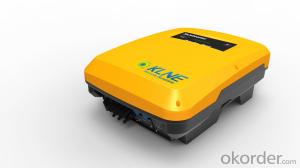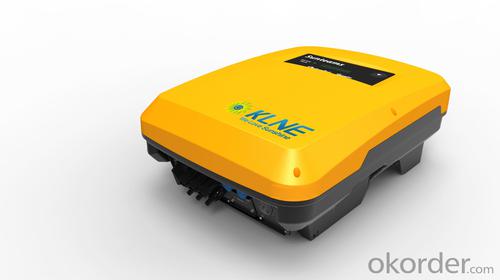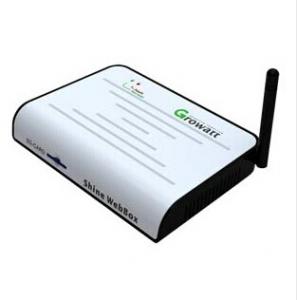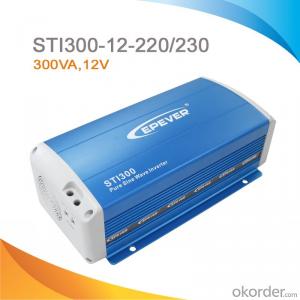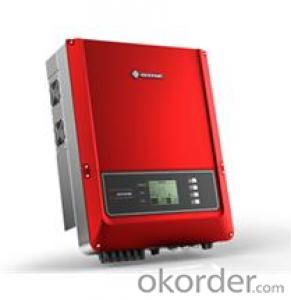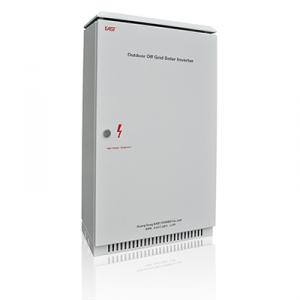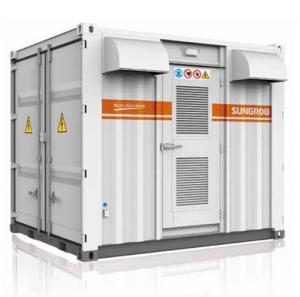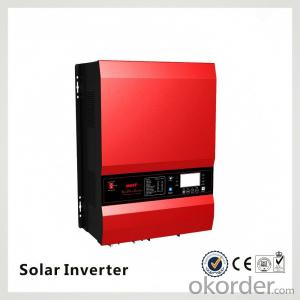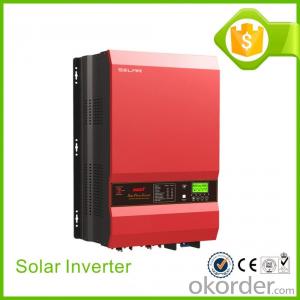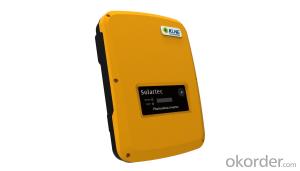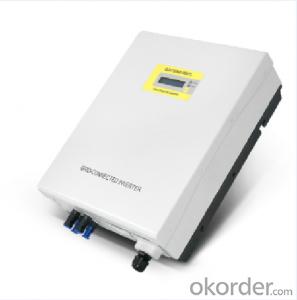Solar Inverter for RV - Solartec 3000-5000 On-Grid Inverter
- Loading Port:
- China Main Port
- Payment Terms:
- TT OR LC
- Min Order Qty:
- -
- Supply Capability:
- -
OKorder Service Pledge
Quality Product, Order Online Tracking, Timely Delivery
OKorder Financial Service
Credit Rating, Credit Services, Credit Purchasing
You Might Also Like
The Solartec 1500~5000 series is applicable to various rooftops and small scale photovoltaic grid-connected power plants. Their nominal output powers are 1.5 kW, 2 kW, 2.5 kW, 3 kW, 3.6 kW, 4 kW, 4.6 kW and 5kW respectively.
This series is transformerless and has a wide range of MPPT input voltage. Its maximum conversion efficiency and MPPT tracking accuracy reach 97.6 % and 99.5 % respectively. The maximum DC voltage reaches 550 V. Its multilingual LCD display facilitates easy operation. It has integrated DC switch and waterproof direct plug-in terminals. It has overvoltage, islanding, short-circuit, overloading and overheating protection functions. Its IP65 protection degree will ensure that it runs well in various tough environments.
Efficient
■ Efficiency of up to 97.6 %
■ Transformerless
■ Efficiency of up to 97.6 %
■ Transformerless
Safe
■ Integrated DC switch
■ Comprehensive protection functions
Flexible
■ LCD backlight
■ For indoor and outdoor installation
Simple
■ ‘Plug and play’connection for easy installation
■ Friendly interface, easy to install and maintain
- Q: Is it possible to monitor the performance of a solar inverter remotely?
- Yes, it is possible to monitor the performance of a solar inverter remotely. Many modern solar inverters come with built-in data monitoring capabilities that allow users to track and analyze the system's performance from anywhere with an internet connection. Through web-based interfaces or smartphone applications, users can view real-time data, such as energy production, power output, and system status, as well as historical data and performance trends. Remote monitoring helps identify any issues or anomalies, optimize system performance, and ensure efficient operation of the solar inverter.
- Q: Can a solar inverter be used with a remote monitoring system?
- Yes, a solar inverter can be used with a remote monitoring system. Remote monitoring systems are designed to monitor and control the performance of solar inverters from a remote location. This allows users to track and analyze the solar energy production, detect any issues or faults in the inverter, and make necessary adjustments for optimal performance.
- Q: What are the indicators of a faulty solar inverter?
- Some indicators of a faulty solar inverter include, but are not limited to, a sudden drop in power output, unusual noises or vibrations coming from the inverter, error messages or warning lights displayed on the inverter's screen, frequent shutdowns or restarts, and a lack of communication or connection with the solar monitoring system.
- Q: Can a solar inverter be used in a solar-powered desalination system?
- Yes, a solar inverter can be used in a solar-powered desalination system. A solar inverter is responsible for converting the DC (direct current) output from solar panels into AC (alternating current) electricity that can be used to power various devices. In a solar-powered desalination system, the solar inverter would play a crucial role in converting the DC power generated by the solar panels into the AC power necessary to operate the desalination equipment, thereby enabling the system to function efficiently.
- Q: How does a solar inverter handle voltage and frequency variations caused by grid disturbances?
- A solar inverter is designed to handle voltage and frequency variations caused by grid disturbances by regulating and stabilizing the incoming AC power from the grid. It constantly monitors the voltage and frequency levels of the grid and adjusts its internal components accordingly to ensure that the power being generated by the solar panels is synchronized with the grid. In cases of voltage or frequency deviations, the inverter employs advanced control algorithms to rectify the imbalances and maintain a steady flow of power to the grid. This helps to protect the electrical appliances and equipment connected to the grid from potential damage and ensures the stability and reliability of the overall power system.
- Q: Can a solar inverter be used in conjunction with a generator?
- Yes, a solar inverter can be used in conjunction with a generator. In fact, it is a common setup in off-grid or hybrid systems. The solar inverter can work alongside the generator to provide electricity when solar power is insufficient, ensuring a continuous and reliable power supply.
- Q: Can a solar inverter be used in systems with different module voltages?
- Yes, a solar inverter can be used in systems with different module voltages by adjusting its settings or using additional components such as DC optimizers or power optimizers. These components help in matching the voltage of the solar modules to the input voltage range of the inverter, allowing for efficient power conversion.
- Q: Can a solar inverter be used in a remote location without access to the grid?
- Yes, a solar inverter can be used in a remote location without access to the grid. Solar inverters are designed to convert the direct current (DC) generated by solar panels into the alternating current (AC) that can be used to power electrical devices. In remote locations, solar panels can be used to generate electricity independently, and the solar inverter can then convert this DC power into AC power for immediate use or to be stored in batteries for later use. This allows for the utilization of solar energy even in areas without grid connectivity.
- Q: Can a solar inverter be used with solar-powered telecommunications systems?
- Yes, a solar inverter can be used with solar-powered telecommunications systems. A solar inverter is an essential component that converts the direct current (DC) generated by solar panels into alternating current (AC) that is required to power telecommunication equipment. This allows for efficient utilization of solar energy in telecommunications systems, making them more sustainable and independent from the grid.
- Q: Can a solar inverter be used with a solar-powered cooling system?
- Yes, a solar inverter can be used with a solar-powered cooling system. The solar inverter converts the direct current (DC) generated by the solar panels into alternating current (AC) that can be used to power various electrical devices, including the cooling system. This allows for the efficient use of solar energy to run the cooling system, reducing reliance on grid electricity and promoting sustainability.
Send your message to us
Solar Inverter for RV - Solartec 3000-5000 On-Grid Inverter
- Loading Port:
- China Main Port
- Payment Terms:
- TT OR LC
- Min Order Qty:
- -
- Supply Capability:
- -
OKorder Service Pledge
Quality Product, Order Online Tracking, Timely Delivery
OKorder Financial Service
Credit Rating, Credit Services, Credit Purchasing
Similar products
Hot products
Hot Searches
Related keywords
